One of the biggest challenges faced by every business is scaling their revenue. While they do have an in-house sales team, those sales representatives have only a fixed number of maximum hours for each day. Hiring more sales representatives to increase your revenue is one of the ways, but one which will increase your operating expenses, lower your operating income and hence eat away at your profit margins.

One of the game-changing strategies which will give you all the benefits of hiring more sales representatives and even more than those benefits, but simultaneously not eat away at your profit margins is a channel sales strategy. The basic premise of a channel sales model is that your channel partner will market and sell your products and services on your behalf and get a share from the total earnings.
What are Channel Sales?
Channel sales include a middleman or a third party vendor who helps your company to sell or distribute your products and services. Essentially, channel sales are B2B sales outsourcing.
Channel sales strategy is about building partnerships with third parties in order to get a wider reach for your products and services and hence facilitate business growth. Increased exposure for your products and services will also lead to increased sales, revenue and gross profits.
Partnering like this allows you to leverage the existing customer base of an established brand such that you can expand your own customer base. However, it often comes at the cost of giving your products and services at discounted prices on these platforms. During such instances, what is then calculated is whether an increase in sales volume makes up for the reduced profit margins in the long run.
What needs to be kept in mind for succeeding through this sales strategy is that you will have to work closely with your partners to make sure they are deploying the correct plans and strategies.
How Can Channel Sales Strategy Help Your Business Grow?
Channels sales strategy is usually implemented as a part of your business growth effort. The 3 ways in which channel sales strategy can help your business grow are:
- To reach new customers who do not buy directly from the vendor, preferring to instead buy from consultants or resellers.
- To sell products or services through third-party marketplaces and managed service providers, which may offer package deals to customers and appeal to buyers looking for different product options and deals.
- Channel sales programs can help you find business in new geographic regions.
While channel sales strategy is not for everyone, it is still one of the best ways to level up your business. However, what needs to be taken care of is that your channel sales strategy does not cause any conflict with your direct sales initiative. To ensure this, your channel sales should be targeted at those markets and demographics that cannot be reached by your direct sales team.
A company will always benefit the most from a well-designed, complementary direct and channel sales strategy.
Channel Sales Vs Direct Sales
In the case of channel sales, a company sells its products and services via a third party. However, in the case of direct sales, the company sells its products and services directly to the consumers.
Companies that use a channel sales model, do not need an in-house sales team, though they can have a mixture of direct and channel sale strategies to increase their revenue by increasing their sales.
In contrast, in the case of direct sales, it is your in-house sales team that is responsible for increasing your revenue. They might do so by using a mixture of inbound sales and outbound methods, where the prospective leads are found, qualified and then turned into closed deals.
Types of Channel Partnership Models
Some of the examples of channel sales partnerships, who are those groups of people who do not work directly for you are:
- Affiliate Partners
- Resellers
- Value-Added Resellers
- Referrals
- Consultants
- Distributors
- Managed Service Providers
- Agents
- Dealers
- Influencers
- Marketplaces
- Independent Retailers
Depending on the type of product and service you have for sale, your company size and the industry that you cater to, you might be able to include several of these partnership models in your sales tactics. Whether you decide to sell to or through your partner is entirely up to you. If you sell to your partner, you will have to be proactive by pursuing new partners. On the other hand, having others to sell for you is most likely to set you up for longer-term, consistent profits.
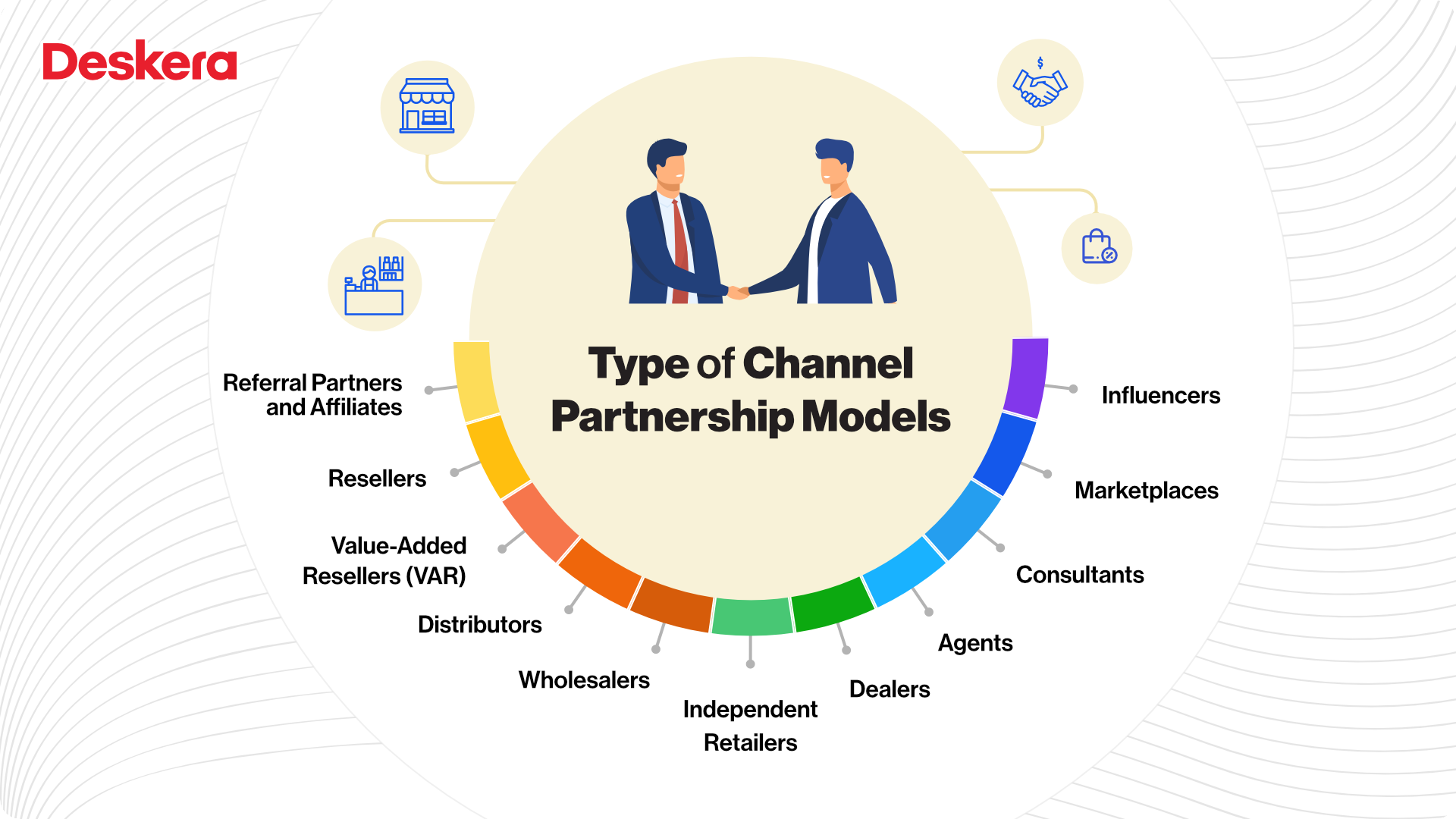
Referral Partners and Affiliates
Referral partners and affiliates are popular sales channels for both SaaS and digital goods. The concept of a referral partner is: someone (a person or a company) refers the lead for a sale to the vendor. The vendor in turn sells directly to the customer and pays the partner a fee when the sale is closed.
These affiliates are responsible for affiliate marketing and promoting of your product and only getting paid once the sale is made. The vendor maintains ownership and ongoing management of the customer. Hence, affiliate programs will allow your company to boost your revenue and facilitate word of the mouth marketing at the same time.
Resellers
Resellers are those who directly purchase your products from you if your product is a physical good. After selling, the profits earned from what they have sold is kept by them as an earning. In this channel sales strategy, the customer will go to the reseller to make a purchase and the reseller will work with its sourcing companies to fulfill the order.
Value-Added Resellers (VAR)
Value-added resellers are different from the resellers in that they add features or services to an existing product and then resell it as an integrated product to the final users. The additional features or services added by them are above and beyond the features of the standalone product.
Value-added resellers are most often seen in the case of SaaS, electronics and the IT industry. An example of a value-added reselling product is a bundle of software applications with the hardware that they supply.
Distributors
Distribution channels provide products directly to the consumers. Some distribution channels are agents, websites or businesses that serve as intermediaries between the companies that produce the product and the final buyer.
Wholesalers
A wholesaler is a type of distributor who specializes in getting the physical products on the store shelves to be purchased by the consumers. Wholesalers tend to have sales representatives who work to sell their products to the retailers. Wholesalers buy in bulk from the source company and hence get them at discounted rates, which are then sold to the retailers after keeping their profit margin.
With increasing purchases by the retailers, their net profit will increase too. However, for the retailers to buy from them, they need to have trust in the wholesalers and the products- old or newly launched that they provide. The most common example of wholesalers is the suppliers who sell food and other goods to the restaurant.
Independent Retailers
An independent retailer is a business owner who has a retail business that is not tied to any major brand or franchise. For example, an entrepreneur who has founded and runs a clothing boutique without the support of a parent company is known as an independent retailer.
Dealers
Dealers sell the products directly to the final consumers but work differently from the retailers who sell several variations of wide varieties of products. For example, the business owner who sells and leases cars directly to the final consumers is known as a dealer.
Agents
In this channel sales strategy, agents are those intermediaries who do not have any ownership over the products and services that they are selling. Agents are those who facilitate deals between buyers and sellers, hence assisting with the negotiation process.
For example, a real estate agent or broker is not the owner of the property being sold to the buyer. However, they are responsible for overseeing the process until an agreement is reached and the sale is closed.
Consultants
Consultants support the creation and efficiency of different sales channels. Consultants help in connecting the retailers, manufacturers, distributors and vendors to ensure smooth delivery of the product to the consumers. Channel consultants do not sell directly but play an integral part in the smooth functioning of channel sales.
Marketplaces
These are those places where the third-party sellers list their products and services and the consumers buy from them. In the case of online marketplaces, it is the marketplace that processes the transactions and not the sellers directly. With each sale made, they get a portion of earning of the total amount, which becomes their earning.
Influencers
Influencers are those who have a good following, enjoy the trust of their audience and can refer your products and services for purchase by the final consumers. Considering that this recommendation comes from an individual that the audience looks up to, they are more likely to purchase the product or services that was referred to and which solves their problem. In the era of social media marketing, influencers have become a vital part of channel sales partnerships.
Pros of Channel Sales Strategy
Adopting a channel sales strategy for your business will have a wide range of benefits apart from one of the benefits being that you will be able to downsize your sales team. These pros of channel sales strategy are:
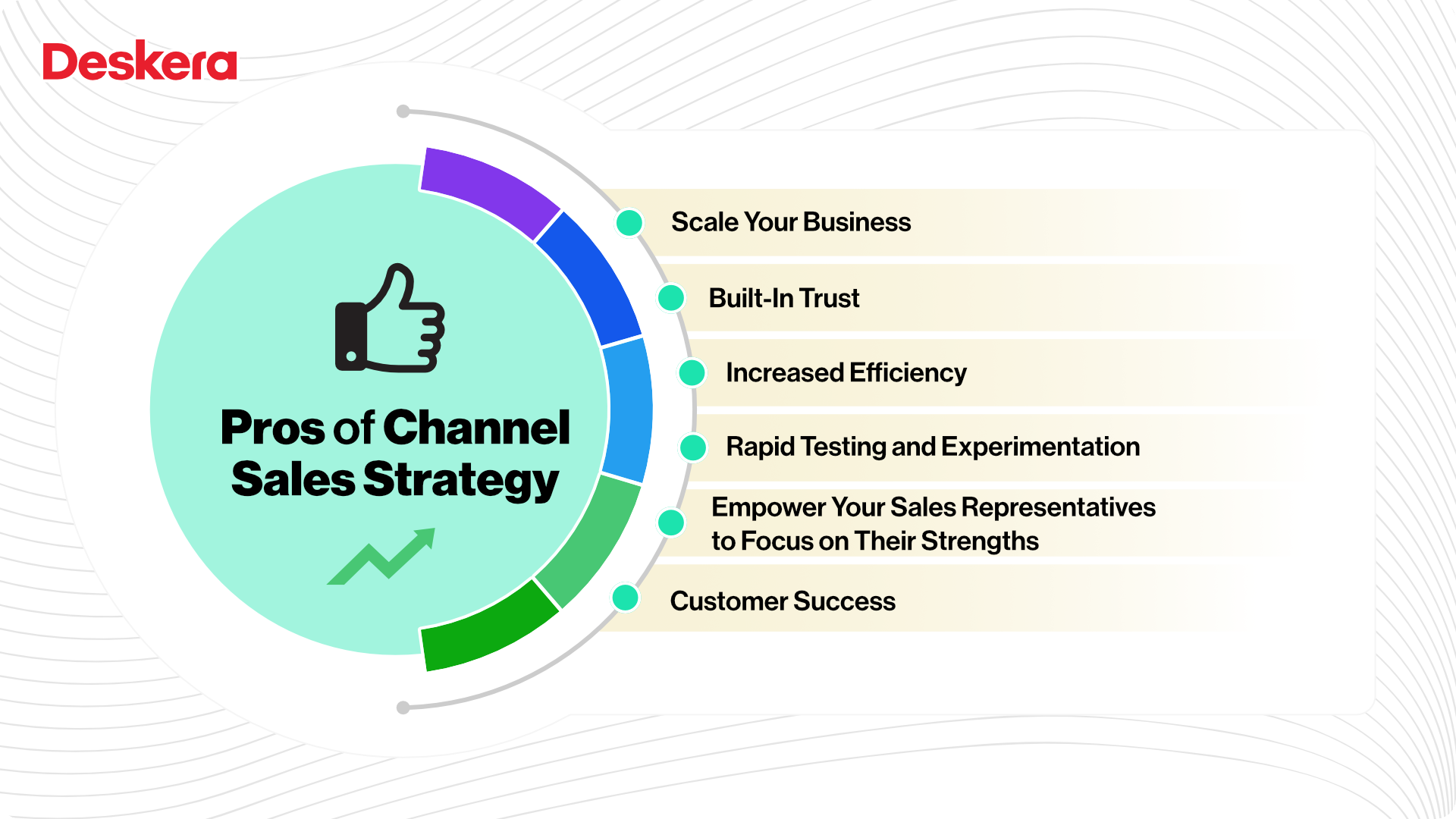
Scale Your Business
Even if your internal resources are limited, with a channel sales strategy, you will be able to scale your business by allowing your channel partners to attract leads and convert them into final sales. Channel sales partners would be able to help you in expanding your network by getting you in touch with those clients that you would not have been able to reach with direct sales strategies.
Such clients would most likely become the bulk of your revenue. However, your channel partners will have to be trained and brought up to date with your products and services. This training will take lesser efforts and time than setting up your direct sales channels, which makes channel sales strategy more profitable for your business.
Built-In Trust
If your channel partner is someone who is already known in the market, you would not have to work in bringing about your brand awareness in accordance with your brand positioning statement. Your product will become credible just with their endorsement. This will save time and efforts taken for building trust through direct sales and help you to make more sales and have higher gross income. This will also quickly improve your cash flow.
Increased Efficiency
When comparing the costs of bringing a certain amount of revenue, the costs would be lower in the case of a group of channel managers as compared against the same size group of the salesperson. Additionally, it is easier to bring in a new partner than hiring a new salesperson. This is especially applicable when your channel sales strategy is ready and so are all of its niches and kinks.
Similarly, because the channel partners tend to be those with already established credibility and access to a wide customer base, by having them partnered with your channel sales strategy, you will be able to reduce your marketing costs as well.
Rapid Testing and Experimentation
Another benefit of adopting a channel sales strategy is that channel partners will let you experiment with new customer bases, products, packages, promotions and marketing campaigns in an environment that holds lower risks. This ensures that after a period of time, your business will be well acquainted with all the specifications of your sales that perform the best for your business.
Empower Your Sales Representatives to Focus on Their Strengths
Channel sales strategy with its partners will help in taking off a load of unrealistic targets from the in-house sales team and operations. By handling the tasks that will meet the business goals and targets, your in-house sales team will be able to focus on building direct relationships with the customers.
This will ensure that you always have your customer’s loyalty on your side, with the building up of relationships encouraging returning customers, improving customer retention and making sure your relationships with the customers do not decay.
Customer Success
If your new customers need help with training, on-boarding, implementation support and service, partnering with vendors who offer these services would be beneficial for your business. This is because by having vendors manage your new customers and hence closing new businesses, you will also be able to focus on your existing customers.
Cons of Channel Sales Strategy
While there are lots of benefits of adopting a channel sales strategy, it does come along with some drawbacks that make it less ideal as well as effective for few businesses. These cons are:
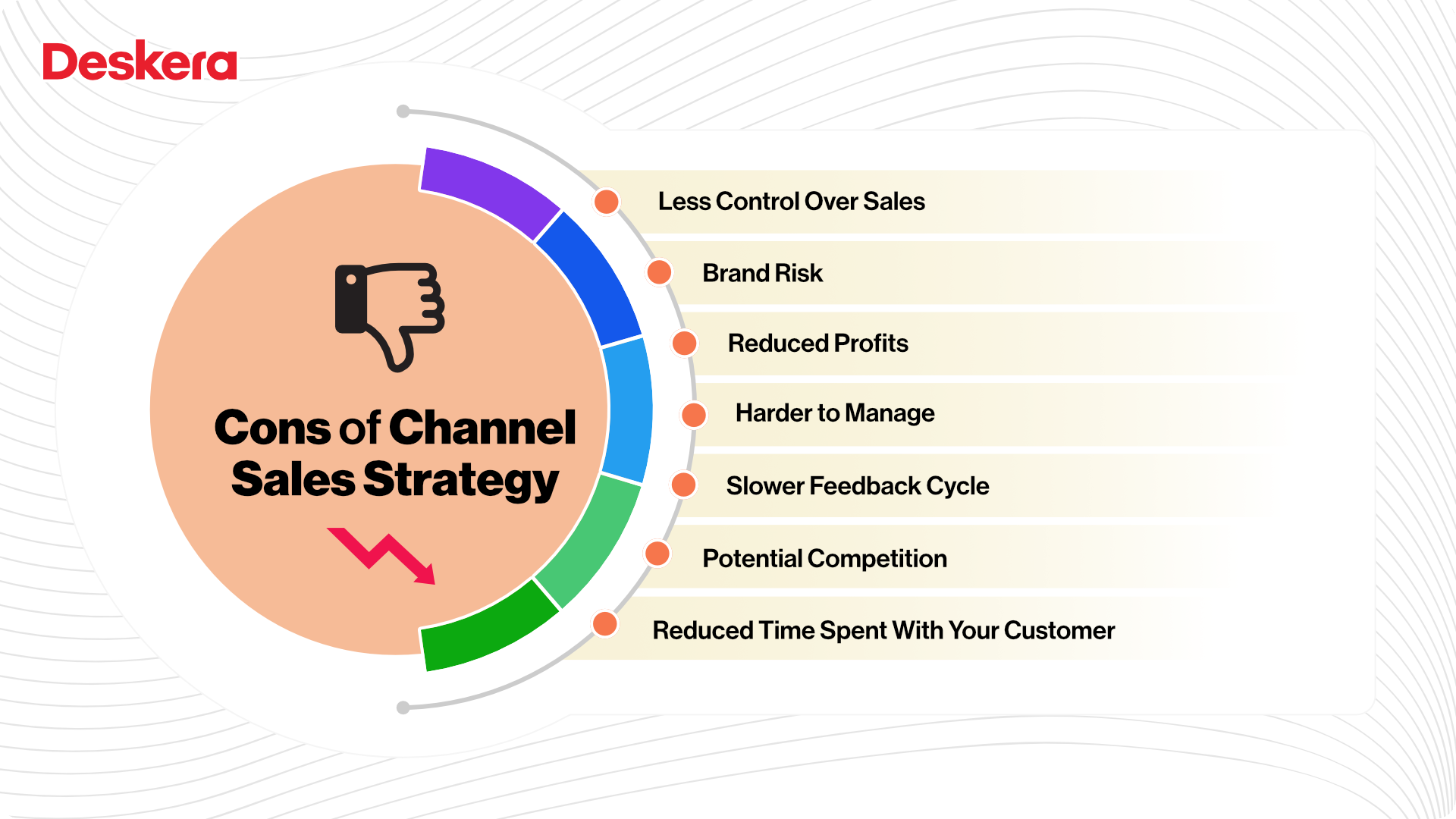
Less Control Over Sales
One of the biggest drawbacks of channel sales strategy is that you have hardly any control over the sales. Even if your channel partner is mismanaging the deal, your salesperson would not be able to jump in and take back control to rectify the situation.
Additionally, your sales team will have no say over the timeline of the deal, which will make it frustrating for your business especially because it will lead to unpredictable revenue.
Brand Risk
If through your channel sales strategy you end up partnering with someone who has a bad reputation and mistreats the customers, your association with them will have a negative impact on your brand image. This will affect your sales, revenue and even the future of your business.
In order to avoid such a situation, it is important to choose a channel partner who is known for his excellent customer service and has a good reputation.
Reduced Profits
In exchange for closing and acquiring the deals, your partners will get a part of the earnings, which will hence lead to you getting reduced profits per each sale. However, it is quite likely that the operating expenses for getting the deal would be cheaper, leading to collectively higher operating incomes.
Harder to Manage
Channel sales strategy is harder to manage because you will be asking multiple external groups to update their sales strategy, change their messaging, add a new product or make any kind of such major shift. For such an adaptation to take place across multiple external groups will not only take time but would also become trickier to manage.
Slower Feedback Cycle
Considering that it is not your in-house sales team, but rather your third party partners who are talking to some or all of your customers, feedback is slow and will take longer to get to you. In addition to this, even if your partners are trustworthy, the feedback received by you might not be 100% accurate as there might have been a difference in understanding, they might have used unreliable methods of gathering or analyzing the results, they might have asked bad questions or they might have used biases in the interpretation. This will hence hamper your chances of understanding your customers perfectly and delivering what they want.
Potential Competition
It can become very messy for your business when your direct sales team starts competing with your partners for channel sales strategy. For example, your sales representative decides to remove your partner from the deal so as to not give up the commission.
If your partners come to know about this, they will stop passing along the leads, which will lead to a lack of lead management from your side. This will lead to losses incurred by your business along with a permanent severed relationship between your sales team and channel partners.
Reduced Time Spent With Your Customers
With the involvement of third parties through your channel sales strategy, it will lead to less time spent with your customers. This will hence also reduce the time spent with them talking, understanding their unique needs, challenges, pain points and desires. This tends to happen more often than not as the third-party vendors do not prefer your salesperson to directly talk with your customers.
However, your channel partners like vendors will assist you through this drawback of channel sales strategy by passing along customer feedback, providing vertical expertise, functional expertise, competitive intelligence, beta testing, product road mapping and many such services which will be beneficial to your business.
How to Know Whether the Channel Sales is Right For You?
In order to assess whether channel sales is the right model for your business, you need to consider the model with consideration of the state of your company, product, sales processes and many more such factors. This segment of the article will discuss such factors for determining whether channel sales is right for you or not in detail.
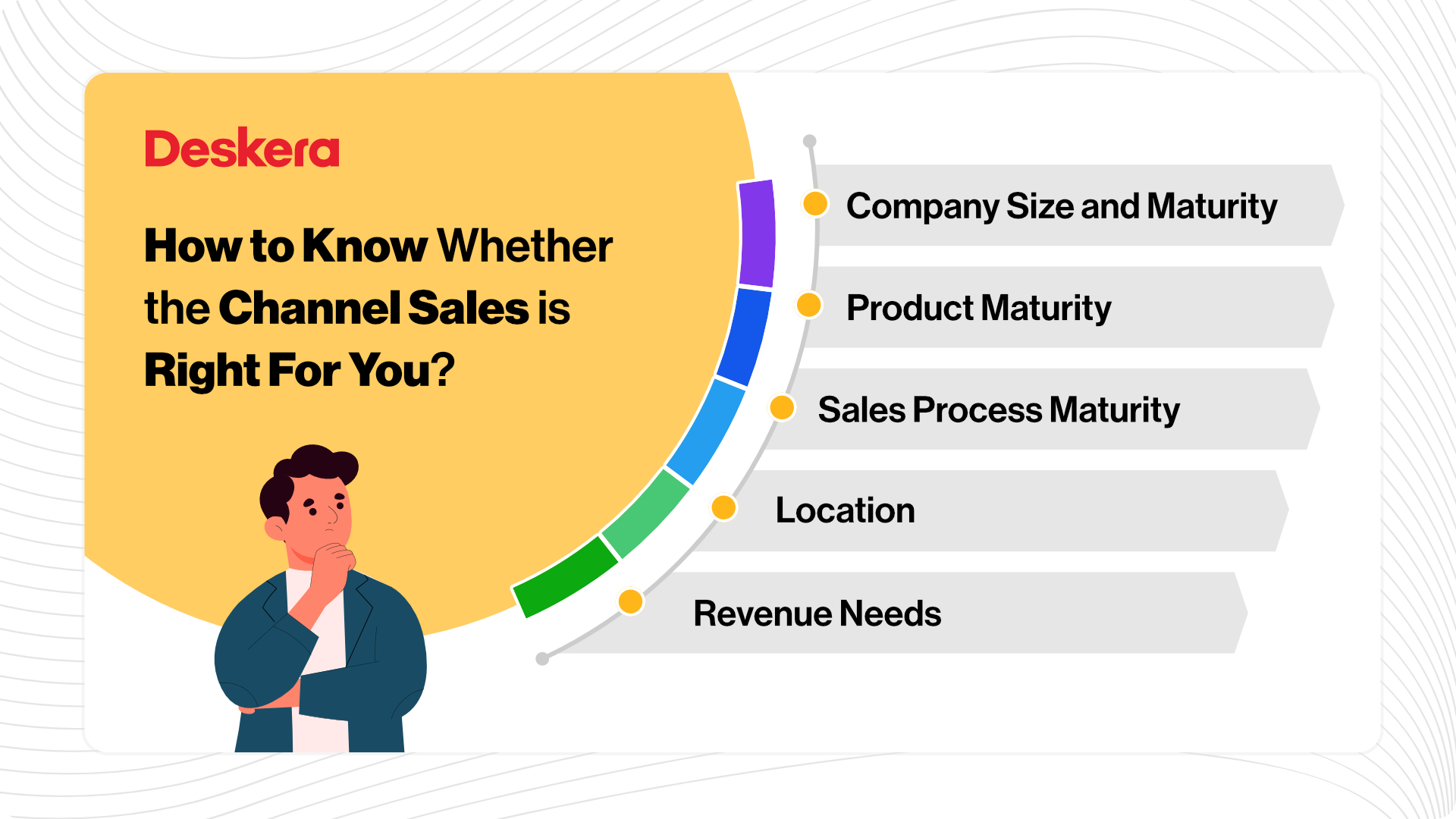
Company Size and Maturity
If your company is small, having a channel sales strategy will help your business to grow without having to invest in and hire a sales team, who will also need to be trained. Having a channel sales strategy will also save on your brand building and other marketing costs as the channel partner would be selling your products and services based on their own reputation. You can shift to having a complementary direct and channel sales strategy or just direct sales once your company grows.
Product Maturity
If your product is something that is new and therefore still immature, having direct relationships with customers becomes beneficial for you as this will let you find out what is working, what is not working and what to build next. In such a scenario, the channel sales model would not be the right fit for your business.
Sales Process Maturity
It is important for you to know your own sales processes before you can teach them to others. Such a sales process involves understanding the various stages of the sales process, knowing the most important buying triggers, knowing which customer stakeholders tend to be involved, the average time taken for each deal to close and other such details.
If you are yet to know your sales process in this manner, you will have to wait before incorporating channel sales models for your business. Additionally, if your sales process is lengthier and more complex, it will be harder for your channel partners to sell your products and services. This means that shorter and simpler sales processes are ideal for channel partners.
Location
If your business offices are spread out across different locations, using channel sales strategies will make more sense than creating multiple sales teams. This however does not mean that you cannot have an in-house sales team. But maybe, you can have a mixture of direct sales model and channel sales model, with your in-house sales team for direct sales present in your prime offices.
Revenue Needs
To have a partner involved in your sales processes will require a lot of time and effort. If time is something that you do not have, and you need quick revenue, the direct sales model is your solution. Only after you have satisfied your initial revenue needs, can you move forward to setting up your channel sales strategy if you think that is the correct fit for your business.
How to Implement a Channel Sales Strategy?
Implementing a channel sales strategy requires research and planning. If your business is planning to have multiple sales channels, you will first need to finalize a process that can be rolled out and replicated with each and every partner or channel you pursue in the future. The key steps to doing this are:
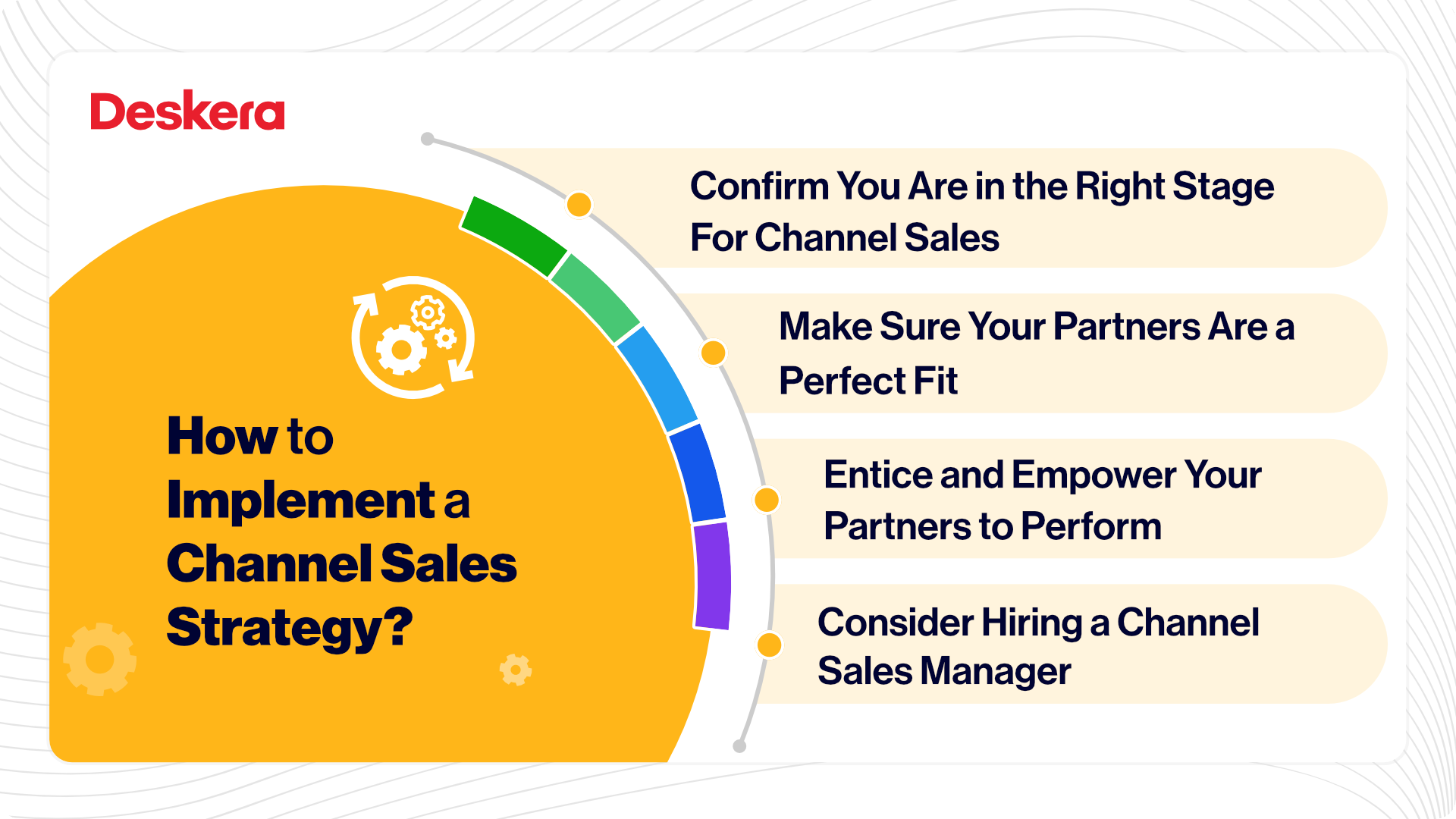
Confirm You Are in the Right Stage For Channel Sales
The first step for implementing a channel sales strategy is assessing whether your business has the bandwidth required for the implementation of channel sales and its success. This assessment should be done before looking for your channel partners. Doing this will ensure that you do not end up disrupting your well-performing sales process.
The 2 main pointers to confirm whether you are in the right stage for channel sales are-
- You have a defined, proven sales process that can be replicated
- You have a clear understanding of how to sell your products to your target audience, and there is enough awareness about your product so that someone else can sell it too.
While these are important factors needed before implementing a channel sales strategy, what needs to be remembered is that some of your channel partners would be able to help you through developing your sales process and finding the right target audience.
Make Sure Your Partners Are a Perfect Fit
The way to find partners that are a perfect fit for your business is by developing a partner profile that has all the attributes that you are looking for to give you the best chance for success.
The basic requirements for a partner to be a perfect fit for your business irrespective of your geographical location and industry are:
- Have a deep understanding of your target audience
- Provides a service or has subject matter expertise in an industry that complements your own
- If they are working in a new market, it should be a market that carries the potential of your business growth
- Have the skills and resources to market and sell your products and services
Entice and Empower Your Partners to Perform
After you have found your perfect fit partner, it is time to tell them how this partnership is beneficial for them and what are the gains that they should look forward to. This should be shared in a manner that empowers your partners to sell you products and services with the same enthusiasm and vigor that your direct sales representatives carry.
Types of extra rewards that can fuel their vigor are:
- Revenue share
- Competitive referral commission
- Discount
- Tickets to exclusive events
- Access to beta features
- Features in your email newsletter
- Premium listing in your directory
And more such rewards that will also make them take your offer more seriously.
However, educating your partners about your product is an important part of enticing and empowering your partners. This education involves teaching them everything about your product and services and what it does for your customer. To do so, resources like webinars, tutorials, testimonials, product specifications and demos will play a big role.
Further on, you should even consider setting up different tiers for your partners. The benefit of having a tier system is that it will enable you to manage expectations with smaller partners and those with a wider reach. It will also incentivize your partners to do more sales, so as to move up the tier system and have higher benefits. However, what needs to be taken care of is that each tier should have its own specifications like sales and technical certifications, sales and marketing training and product training.
Additionally, all the past analyzed data in regards to your customers and sales will aid your partner in understanding your business trends and your target market trends better. In short, your partners should have all the tools necessary for closing deals with your customers.
Consider Hiring a Channel Sales Manager
If your business is one that has decided to have channel sales as one of its main sales models, hiring channel sales managers to partner relationships is of utmost importance. This will ensure that each of your partners gets the attention that they deserve in order to be successful.
In addition to this, channel sales managers will also be responsible for providing the necessary resources to the partners and keeping tabs on their performance. They can also help the partners with deal strategies while motivating them to perform better.
How Can Deskera Assist You With Channel Sales?
Deskera is an all in one platform for all your business needs. Its products like Deskera CRM is the perfect solution for all your sales processes including channel sales. This is because Deskera CRM can be used to manage your sales pipeline. In fact, it even allows you to make your own customized sales pipeline.
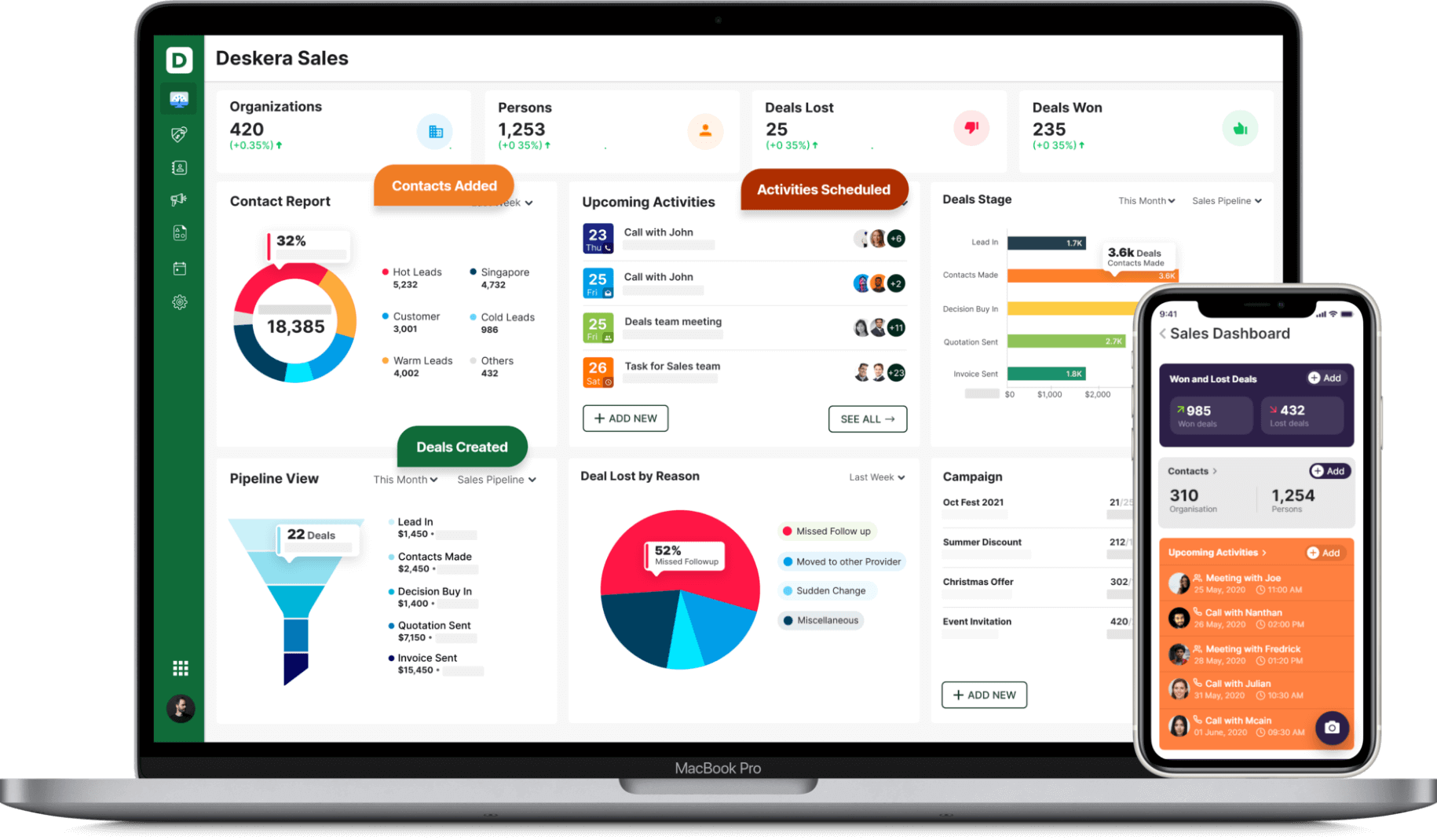
Additionally, it has contacts and deals management through which you can manage your contacts, every detail about them, their categorization and the organization that they belong to. It will also let you import your contacts from other platforms to Deskera CRM to have them all on one platform.
With deal management, you can track your deal through its different stages, have insights on how each deal is performing which will help you find out your marketing attribution and even have the deal manager’s name, which in this case would be your channel partner mentioned there. This will also enable you to schedule sales and sales’ assistive processes. It will also help in tracking the performance of each of your channel partners and assess if they are the perfect fit for you or not.
Additionally, this will also let you undertake automatic email marketing campaigns, with few email marketing templates pre-loaded in the Deskera CRM system. Additionally, through Deskera CRM+ you will also be able to create your own landing pages and CTAs that will complement your channel sales strategy.
In addition to this, Deskera Books will let you track your financial performance, financial KPIs, marketing KPIs and financial statements like income statement, profit and loss statement, cash flow statement and balance sheet. These insights, along with customer’s feedback which ensures the voice of customers is heard, will help in improving your business strategies and operation such that you win more customer loyalty, improve customer retention and even encourage returning customers.
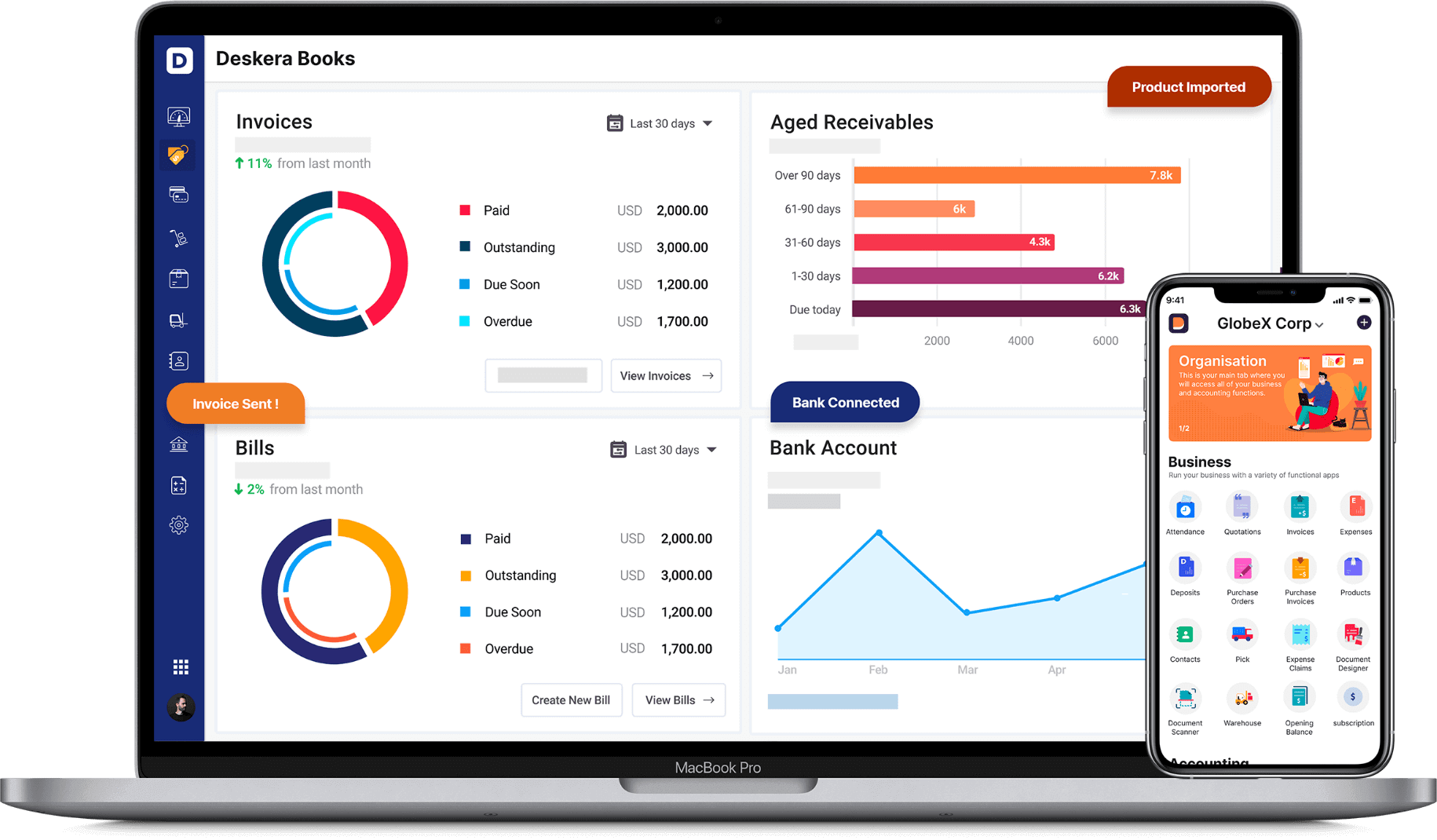
Key Takeaways
Irrespective of what product you are selling and which industry you are part of, channel sales has become the key component of business growth. Channel sales model and strategy is the perfect fit for your business at a stage where you have an established sales process and you are looking to scale faster.
Having channel partners will save on lots of your efforts, expenditures and also help you to reach those demographics which were previously inaccessible. Hence, the steps to implementing channel sales strategy are:
- Confirm You Are in the Right Stage For Channel Sales
- Make Sure Your Partners Are a Perfect Fit
- Entice and Empower Your Partners to Perform
- Consider Hiring a Channel Sales Manager
How to know whether the channel sales model is right for you or not can be determined based on these factors:
- Company Size and Maturity
- Product Maturity
- Sales Process Maturity
- Location
- Revenue Needs
The pros of channel sales strategy are:
- Scale Your Business
- Built-In Trust
- Increased Efficiency
- Rapid Testing and Experimentation
- Empower Your Sales Representatives to Focus on Their Strengths
- Customer Success
The cons of channel sales strategy are:
- Less Control Over Sales
- Brand Risk
- Reduced Profits
- Harder to Manage
- Slower Feedback Cycle
- Potential Competition
- Reduced Time Spent With Your Customers
The types of channel partnership models are:
- Referral Partners and Affiliates
- Resellers
- Value-Added Resellers (VAR)
- Distributors
- Wholesalers
- Independent Retailers
- Dealers
- Agents
- Consultants
- Marketplaces
- Influencers
Hence, it is how you design your channel sales strategy and who you partner up with which will determine how well you will be able to avoid the drawbacks of channel sales strategy and maximize the benefits derived from your channel sales strategy.
Related Articles












